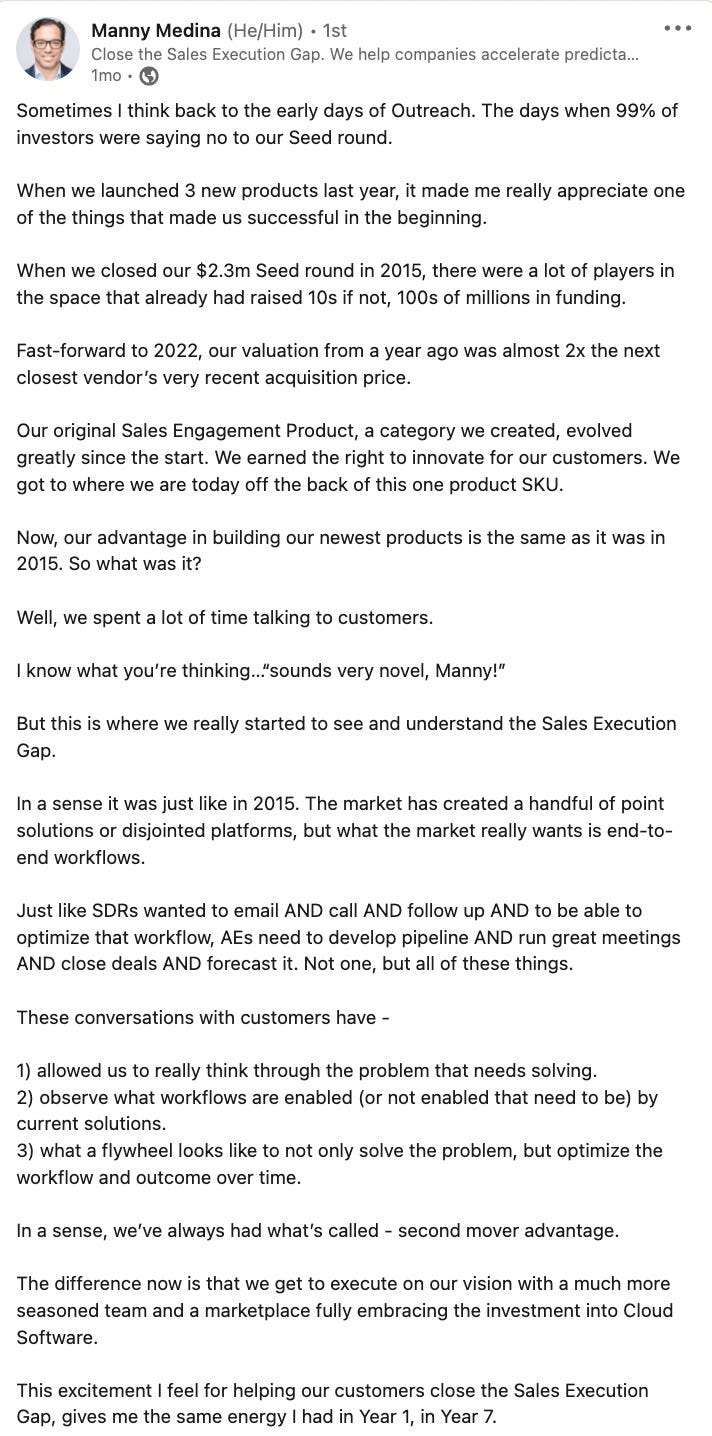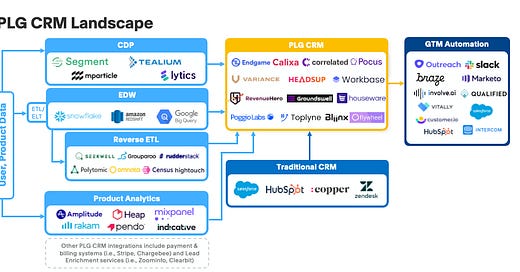Ignore Competitors, Obsess Over Customers
My plan to beat competitors that have 50X our funding
If this is your first time reading What I Learned, subscribe below—I share learnings from my journey starting a software company that I plan to grow for the next decade+.
Hey, y’all!
What a whirlwind of a few weeks it’s been. Usually, I write a few punchy sentences summarizing some interesting current events (mostly in tech) with a few links. Hard to know what to include right now. A war started abroad, and here in America, we have celebrities at the Oscars punching slapping each other for saying rude jokes. Not sure what that says about the current state of America. Oh, and one of the richest entrepreneurs (Elon Musk) bought 9.2% of Twitter. 🤷♂️ But I’m not here for commentary on pop culture or macro-economics.
Today, I’m talking about how to handle competition in an early-stage start-up.
I am writing this post to codify my thinking on the subject, for a few reasons:
Reminder to my current self.
Reminder to my future self.
To help other founders who are also building in highly competitive markets.
And, honestly, for a small cathartic release. :) (Thanks for indulging me)
As the underdog, here are the four ways I’m focusing my attention as it relates to our highly competitive situation:
1/ Competitors distract from what matters most: customers
2/ Fear is (only mostly) bad
3/ Competition is validation
4/ Force yourself to think long-term
Let’s get into it.
The underdog
I started Groundswell ~8 months ago with two co-founders. And there are a lot of very impressive companies who compete directly with us today.
One of those companies has raised $50M. And several others have raised $10M+.
We have raised far less.
We have a long-term vision that is differentiated, but in the short-term, we are just one of several companies being called “PLG CRMs”—check us out in the little box below.
Almost all of the other companies in that little box have a lot more money and people than us. However, I’m confident we’ll be the long-term winner in the space. But it can be hard to see the light at the end of the tunnel at times.
This week, I was on a call with the CMO of one of the fastest-growing companies in the revenue tech space. When asked about competition in the early days, he told a story about one of their board members giving advice to them at the time—he recited this phrase, as if he had said it to himself hundreds of times—perhaps into the mirror every morning, for years. He said:
Obsess over your customers,
Be aware of your competitors.
It’s one of those phrases that is simple to say, but hard to practice.
Now, do I think we’ll always be the underdog? No. But when we no longer are the underdog in our space, I hope we find a new arena to step into, with bigger competitors, at which point, the cycle starts over. So I may as well settle in and get comfortable with this new reality.
1/ Competitors distract from what matters most: customers
This is the biggest takeaway, by an order of magnitude.
Not only do competitors take time away from you, but more importantly, it is a very expensive distraction when you see them release a new feature and you think to yourself “I need to do that too.” Here’s the problem. You you shouldn’t build features just because your competitors built them. Instead, you should build things because your customers tell you about a real problem they need to solve. So, as a result of looking at competitors’ websites, press releases, blog posts, social media posts, etc., you end up spending less time with customers and building more features that your customers do not actually want.
I have heard many smart founders and investors say that very few companies die from competitors, instead, it is self-inflicted wounds that kill 99% of start-ups—bad product decisions, bad hires, disagreement among founders, or simply running out of money. It’s easy to hear these things and ignore them when we have a competitor who raised $50M and we have only raised around 3% of that amount.
But in the end, I need to focus on first-principles thinking, and why I started this company to begin with. No one can out-compete me in my personal experience, both at Zoom and previous companies where I was solving this problem, either tangentially or explicitly. I know the solution that should exist in the world. And our competitors don’t seem to be building in the direction we’re going. It’s surprising to me, but exhilarating. The more they build, the further from the core value I hope they get. It’s not that I want them to lose, it’s just that… well, I want to win.
We’re all early enough that we’re sprinting to find the elusive “product-market fit.” So we just need to out-execute, and get there faster, regardless of the resources we have (or don’t have) right now.
One last note - I have made a point to get to know the founders of our competitors. I am doing this for three reasons:
I believe in a net-sum world (not a zero-sum world).
Who knows how things will shake out. We could pivot and/or consolidate over time.
We’re building in a massive market and it is not a winner-take-all, so working together to create a category will help all of us (“a rising tide raises all boats”).
2/ Fear is (only mostly) bad
I’d be lying if I said these companies didn’t scare me. But I know I can win in the long-term, even if the scoreboard shows otherwise right now. For me, I believe that some amount of paranoia is actually healthy—after all…
Only the paranoid survive.
It’s less that I’m nervous about a competitor shipping some breakthrough product or feature, and more about my paranoia that I am not moving fast enough. To be completely honest, I think this is healthy (assuming it doesn’t get out of control).
I just can’t let fear overwhelm and paralyze me.
So, this is a note to myself. A note to myself so that I can plug back in and get to work. A note to myself so that when I log in next week I can read it and be reminded. And a note to myself a decade from now when I can chuckle about “all those competitors” who raised “all that cash” but are nowhere to be seen. It will happen. And now I have the receipts to show for it when it becomes a reality.
But, what do you do when your competitor has 50X more money than you do? Or when your competitor has 5X the number of employees?
You pick up your phone and call customers. Then, you put your head down, you put in your headphones, and you go to work. You grind. You ignore all of the external noise, and you focus 100% of your time, attention, and resources on your customers. Nothing else matters. Nothing.
3/ Competition is validation
As a founder, you have to be a rational optimist.
There is a lot of talent and funding in our space. This is validation that we’re (most likely) building in a good space, and one that will organically grow. It’s better to have a good product in a great (fast-growing) market, than a great product in a good (shrinking) market.
What I advise against: seeing a “hot space” and trying to build a solution in that space just because it looks like a lot of people are building there. You do have to have a unique insight, and ideally (as Paul Graham would say), you and your friends have this problem so you’re building for yourself. So don’t start a company just because there are a lot of competitors building there already.
Peter Thiel famously said “Competition is for Losers.” And I agree—at a certain point, you have to break out and be fundamentally different, so that you can build a winner-take-all dynamic. But in the very early days, I believe it is okay if there are a lot of other companies that are doing something similar to you. More companies in the space means you’re likely onto something. Now it’s just about executing on your vision.
4/ Force yourself to think long-term
I’m on a decade+ long journey. So thinking long-term is not helpful here—it is mission-critical.
I’ll leave you with a post from Manny Medina, Co-founder, and CEO of Outreach. I watched this company from the early days, before they pivoted into Outreach. It just so happened that Manny was renting a desk in the office of the company I worked at in San Francisco. (As a side note, I had the opportunity to invest at a $3.5M valuation. I passed. They’re worth $4B+ today. Whoops.) So, I have been able to observer their journey first-hand, as they grew from a couple of employees to over 1,000, and from zero in revenue to over $150M (and I believe they still have at least 10X to go from here). Notice how Manny talks about the early days of Outreach, and where he focused his time and attention (spoiler: it wasn’t on his competitors).
I’ll see y’all in a decade.

Links to interesting corners of the internet
I revisited a couple of classics (they are aging quite well) → Paul Graham’s How to Start a Startup and Chris Dixon’s The Idea Maze
An epic interview from 2018 (rare to have both on stage): Google Founders Interview - Larry Page and Sergey Brin (h/t Sergio for always finding these old nuggets of gold)
Woke Institutions is Just Civil Rights Law Why Conservatives Won't (and Can't) Fight for Influence, and What to Do About It. Followup to "Why is Everything Liberal?" and "2016: The Turning Point"
Ethereum Explained ft. Preethi Kasireddy (45 minute YouTube video)
🦣 “$75M to build Jurassic Park” — Colossal’s wooly mammoth startup.
Our pseudonymous friend, “6529”, creating a tear-jerking twitter thread this week—I can’t recommend it enough👇
Quote that caught my attention
Nothing in the universe is hidden.
-Eihei Dogen (Zen Philosopher); from the essay, “Instructions for the Cook”
See y’all next time,
Brendan






Hey Brendan - wondering what trends you are seeing in the way customers describe this problem. Also, do you have any observations about enabling these customers as they learn more about the space?